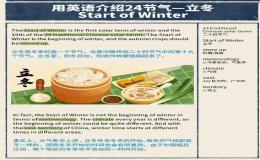
立冬的英语表达及习俗(插图)
立冬的英语表达很简单,即Start of Winter。
古时人们将立冬视作冬天的开端,然而,受地理环境和纬度因素影响,各地实际入冬的时间也会不同。
In fact, the Start of Winter is not the beginning of winter in terms of meteorology. The climate every year is different, so the beginning of winter could be quite different. And with the vast territory of China, winter time starts at different times in different areas.
事实上,从气象学上讲,立冬并非冬天的开始。每年的气候都是不一样的,因而冬天开始的时间也会有所差异。由于中国幅员辽阔,每个地区的冬季也不会在同一时间开始。
立冬有哪些习俗呢?
Beginning of winter or not

立冬是否是冬天的开始?
In ancient times, the Chinese people took the Start of Winter to be the beginning of the winter. However in fact, the Start of Winter is not the beginning of winter in terms of meteorology. The climate every year is different, so the beginning of winter could be quite different. And with the vast territory of China, winter of every area doesn’t begin at the same time.
在古代,中国人把立冬当作冬天的开始。然而事实上,从气象学的角度来看,冬天的开始都不是立冬。每年的气候都不一样,所以冬天的开始可能会很不一样。而且中国幅员辽阔,各地的冬天并不是同时开始的。
Welcoming the winter in ancient times
古代迎冬
The four beginnings of the seasons were important festivals in ancient times. Before the Start of Winter, the ancient emperor would take a shower and have no more meat. On that day, the emperor would lead his officials to the suburbs and perform the ceremony of "welcoming the winter."
在古代四季的开始是一个重要的节日。在立冬之前,皇帝通常会洗个澡,不再吃肉食。在这一天,皇帝会带领他的官员到郊区,举行“迎冬”仪式。
Eating dumplings
吃饺子
A legend has it that at the end of the Eastern Han Dynasty (AD25-220), "Medical Saint" Zhang Zhongjing saved many people in Henan province from a typhoid epidemic and their ears’ from being frostbitten around Start of Winter.
传说在东汉末年(公元25-220年),“医圣”张仲景救了许多河南人,让他们免于流行伤寒,帮助他们在初冬时耳朵免于冻伤。
He cooked mutton, hot peppers and herbs to dispel the cold and increase body heat. He wrapped these ingredients into a dough skin and made them into an ear shape. Since then, people have learned to make the food which became known as "dumpling". Today there is still a saying that goes "Eat dumplings on Start of Winter Day, or your ears will be frostbitten".
他通过煮羊肉、辣椒和一些草药来给大家驱寒,增加体温。他把这些配料包在一个面皮里,做成耳朵形状。从那时起,人们就学会了包饺子。今天仍然有一个说法,“在初冬吃饺子,否则你的耳朵会被冻伤”。
"Nourishing the winter"
“养冬”
On the first day of Start of Winter, there is a custom, "nourishing the winter", in Southeast China in places such as Fujian, Guangdong and Taiwan provinces. To prepare for the oncoming cold winter, people there like to eat high-calorie food such as chicken, duck, beef, mutton, and fish, which are usually stewed with the four Chinese medicines: angelica, ligusticum wallichii, Chinese herbaceous peony and rehmannia glutinosa libosch, to enhance the effectiveness of the nourishment.
在立冬的第一天,在中国东南部的福建、广东和台湾等省份有一个习俗,叫“养冬”。为了应对即将到来的寒冷冬天,那里的人们喜欢吃高热量的食物,如鸡、鸭、牛肉、羊肉和鱼,这些食物通常与当归、川芎、芍药、地黄四味中药一起炖,以提高营养的功效。
Eating Chinese pumpkins
吃南瓜
In Tianjin, on the first day of Start of Winter, people eat dumplings stuffed with Chinese pumpkins (wogua). It is a common vegetable in North China. Generally, the pumpkins are bought in the summer and stored until the Start of Winter when they are taken out.
在天津,在立冬的第一天,人们吃南瓜饺子(倭瓜)。它是中国北方常见的蔬菜。一般来说,南瓜是在夏天买好,然后储存到冬天开始的时候再取出来。
“冷”的几种表达
1. freeze
vi. 冻结;冷冻;僵硬 n. 冻结;凝固
(1) If the temperature drops below 0°C, water freezes.
如果气温降到零度以下,水就会结冰。
(2) When we freeze water,it turns into ice.
当我们冷冻水的时候,水变成冰。
【freeze的引申义就是“严寒”,这时它有两种形式:freezing和frozen。】
2. freezing 极度寒冷
也可以说成freezing cold。可以用来形容人或人的身体部位,也可以用来形容其他事物。
(1) We were freezing cold in the tent last night.
昨天晚上我们在帐篷里太冷了。
(2) I had to wait for hours on the freezing cold station platform.
我得在极度寒冷的站台上等几个小时。
3. frozen 冻结的,冷酷的
也可以说成frozen stiff,专门用来形容人或人的身体部位。
(1) He put one hand up to his frozen face.
他把一只手伸向他冻僵的脸。
(2) After walking through the snow, my feet were frozen stiff.
从雪地里走过后,我的脚都冻僵了。
4. chill寒冷的;冷漠的
Walking home in the snow, we got chilled to the bone.
我们蹚着雪往家走,快要冻僵了。
5. chilly 寒冷的,怕冷的
The bathroom gets chilly in winter.
冬天,浴室变得很冷。
6. frosty 结霜的,严寒的;冷淡的;灰白的
It was a cold and frosty morning.
这是一个天寒地冻的早晨。
7. parky(天气、空气)寒冷的
It's a bit parky outside today.
今天外面有点冷。
8. icy 冰冷的;冷淡的;结满冰的
She opened the window and I was hit by an icy blast of air.
她打开窗户,一阵冷风向我袭来。
9. frigid 寒冷的,严寒的, 冷淡的
Frigid winds blew from the north.
寒风从北方吹来。
10. coldness 寒冷,冷淡
The icy coldness of the water revived her.
水刺骨的寒冷使她苏醒过来。
 本文地址:
本文地址: